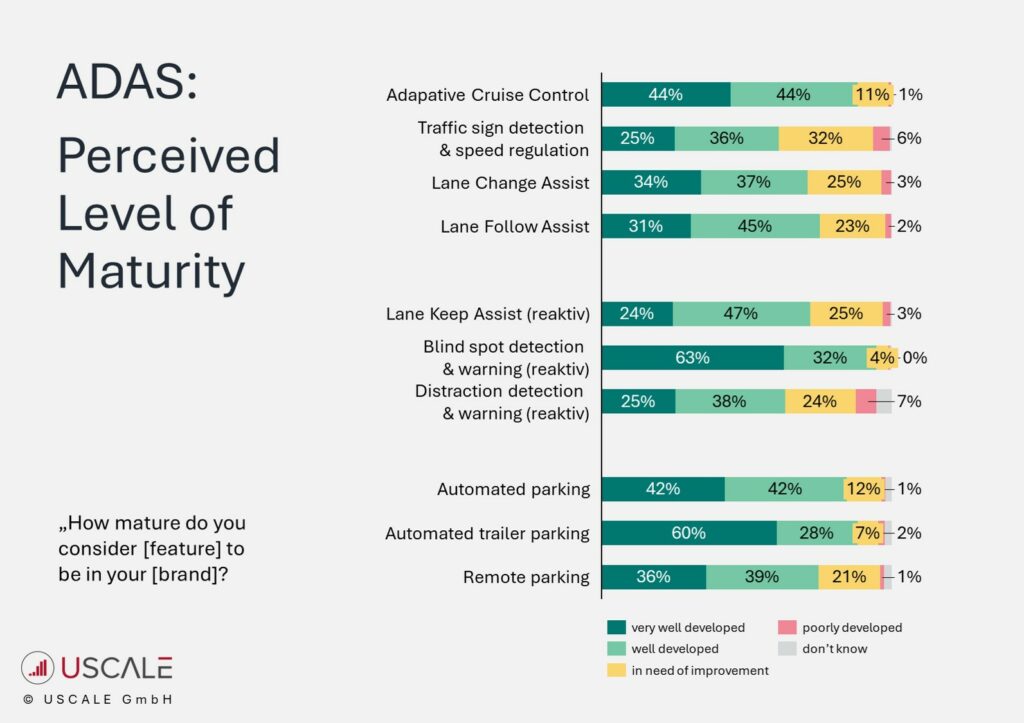Automotive users lack trust in autonomous driving – USCALE study shows acceptance and usage experiences of the most important assistance systems in vehicles
ADAS Satisfaction Study 2025: Automotive Users Lack Trust in Autonomous Driving
Stuttgart, 4 November 2025 – Modern driver assistance systems are considered essential for the future of autonomous vehicles. However, consumer trust in these technologies remains surprisingly low. According to a recent survey of more than 4,000 car users in Germany, technological progress alone is not sufficient to secure widespread acceptance of autonomous mobility.
USCALE has, for the first time, conducted a comprehensive analysis of users’ experiences, focusing on the actual usage, major hurdles, and areas for improvement of key Advanced Driver Assistance Systems (ADAS).
The study examined real-world experiences with four core ADAS:
- Adaptive Cruise Control (ACC),
- Traffic Sign Recognition with automatic speed adjustment,
- Lane Change Assist, and
- Lane Follow Assist
Key Findings
- 88% of respondents rate the maturity of Adaptive Cruise Control in their vehicle as good or very good.
- In contrast, only 61% are satisfied with the maturity of their traffic sign recognition systems. Ratings for Lane Change Assist and Lane Follow Assist also remain moderate, with 71% and 76% respectively reporting these features as good or very good.
- Actual usage rates of installed assistance functions vary widely, ranging from about 25% to over 90%. The main reasons for non-usage are lack of reliability and trust, as well as safety concerns.
- Even among users, many report less than full satisfaction: 31% of adaptive cruise control users feel patronized by the system, 35% find interventions annoying, and 19% feel anxious when using these features.
- Reactive assistance systems also show mixed results. The Blind Spot Assistant is considered technically mature by 95% of its users, followed by the Lane Keeping Assistant (72%) and the Driver Distraction Warning (63%).
- Parking assistance systems receive average marks for satisfaction. Automatic parking sensors are rated good or very good by 84% of users, automatic trailer parking by 88%, and remote parking by 75%.
- Common complaints include unexpected system responses, unreliable object and road marking recognition, abrupt or delayed interventions, and intrusive warning sounds.

Expert Comment
Dr. Axel Sprenger, CEO of USCALE GmbH:
„I was really surprised. When 10 to 40 percent of drivers consider the ADAS in their vehicle not mature and around 10 percent feel anxious while using them, this is a wake-up call for the industry. Only when drivers trust all assistance systems and these operate seamlessly will autonomous driving become a reality. Unfortunately, our data clearly show that we are still a long way from that goal.”
Study Methodology
The ADAS Satisfaction Study was conducted by USCALE from April to June 2025, surveying a representative sample of 4,025 car owners in Germany. Only systems actually installed and used in vehicles first registered in 2022 or later were evaluated.
The study documents satisfaction, perceived maturity, system issues, and recommendations for automotive and supplier industry development departments. It also analyzes reasons cited by non-users for not using assistance systems.
Detailed results are available for brands including Audi, BMW, Cupra, Ford, Hyundai, Kia, Mercedes, Renault, Skoda, Tesla, Volkswagen, and Volvo.
Further Information:
Further information about the study
Overview study content
About USCALE
USCALE is a consulting and market research company specializing in electromobility and based in Stuttgart, Germany. USCALE’s core business is conducting customer insights studies covering all touchpoints of the e-mobility customer journey.
Contact
USCALE GmbH, Silberburgstrasse 112, D – 70176 Stuttgart, media@uscale.digital
